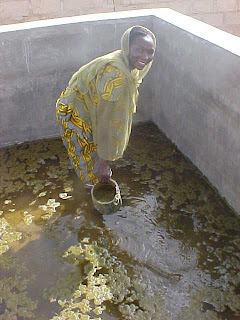


I still remember the announcement in 1985. One of my teachers, Keith Parker, was going to the Bahamas in 1986. I thought, "He'll let me go hang out on the beach." Little did I know that we were going to be out serving folks in abject poverty on the streets of Nassau. After that 2-week experience, Keith asked me how I felt about the experience. I replied, "I think that I want to do this the rest of my life." This led me to Nigeria, Scotland, Zimbabwe, India, and Kenya. Yet, my heart felt the greatest burden for the receptive masses of West Africa especially near the Sahara Desert.
In 1998, I was serving in a work that focused on the poor metropolitan communities of Long Island, New York. At a singles retreat, I bumped into a young lady from Pennsylvania, Jennifer Becker, who talked about her interest in serving the poor in Ghana. Her father had traveled to Ghana and returned with an African doll in 1975 which planted a seed of service. Thus, after Jen and I had been married for a couple of years in 2000, we traveled to Nigeria exploring options for potential service. Northern Nigeria emerged as the location with the greatest need for expatriates with a heart to serve one of the least-developed regions of the world.
As Jen and I began serving the people of central Nigeria in 2001, our favorite work was among the villagers in the rural countryside. These were the places with no electricity, no pipe-borne water, no tarred roads, no clinics, and no schools nearby. As I served in religious education along with the University of Jos, my burden became greater to serve the poorest of the poor. Week-long trips into remote towns of northern Nigeria kindled a greater desire to serve among the most educationally backward. Jen and I began to wonder how the scope of our service could shift to a more humanitarian-based work.
In 2004, the executive director, Clement Iornongu, of the International Centre for Peace, Charities, and Human Developent (INTERCEP) approached us in central Nigeria. His idea was to offer me to serve as INTERCEP's International Development Director in northern Nigeria. As we began surveying which state to locate an INTERCEP branch office, northeastern Nigeria emerged as the most suitable environment. Borno State was known all over West Africa as the "Home of Peace" in Nigeria and Maiduguri was it's capital with a reputation for inter-tribal harmony. Thus, in 2005, the Blake family relocated from the Plateau highlands of Jos, Nigeria to the semi-arid sandy soil of Maiduguri to open a branch office for INTERCEP.
In 2006, our INTERCEP office in Maiduguri was approached with a parcel of land to develop for some indigenes of Borno State. As a significant amount of money was raised to erect a perimeter wall around this field, we were encouraged to create a 501c3 non-profit organization in the USA. This created the dream of Arewa Aid as a humanitarian organization to help disenfranchised communities of northern Nigeria.
"AREWA" means "NORTH" in the Hausa language of northern Nigeria but really embodies a culture. When someone in Tennessee says "The South" they're not talking geography but Cracker Barrel, SEC football, and the Grand Ole Opry. This is what "AREWA" means to someone living in northern Nigeria: Islam, Hausa language, wearing kaftans (long dress), eating tuwo (corn meal mush), singing with the algaita (flute).
Board members from Arewa Aid were recruited from Tennessee, Texas, Pennsylvania, New York, Maryland, and Washington. On July 25, 2007, Arewa Aid was granted official non-profit status by the US government increasing the legitimacy of our fund-raising efforts.
The Blake family serves with INTERCEP in Nigeria and AREWA AID in the USA to create strategic partnerships to develop the poorest African people starting in northern Nigeria. Our humble beginnings have mobilized that abandoned Maiduguri field into a thriving drip irrigation farm growing vegetables in the dry season. Our 2008 goals involve supplementing this booming vegetable farm with livestock to create a balanced ecosystem. Our objectives beyond agriculture include a skill acquisition center, rural mobile clinic, and primary education for the poorest children. God is writing our story and we invite you to participate in helping the world's poorest people beginning in northern Nigeria.






